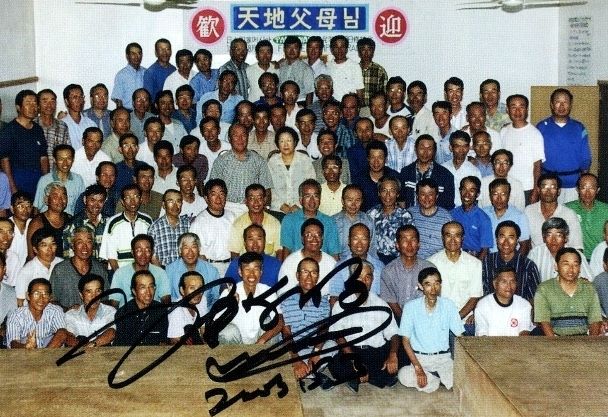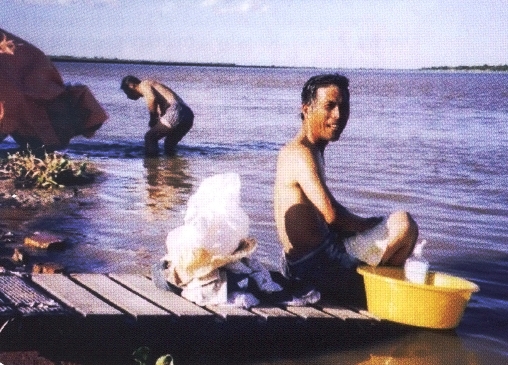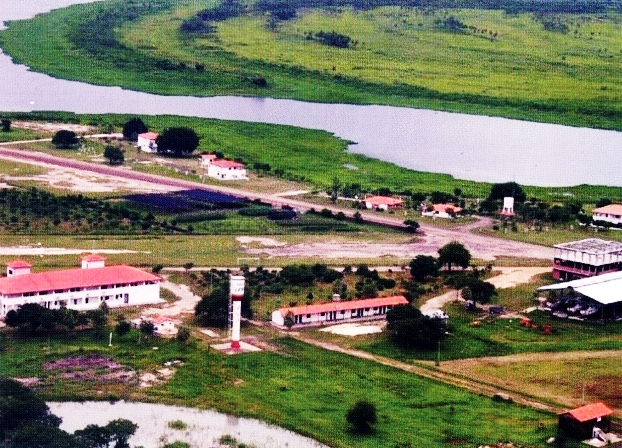![]()
The Words of the Sano Family
|
|
The Words of the Sano Family |

The
beginnings: Japanese national messiahs with True Father on the
forty-day workshop in 1999; the signature, given later, is Father's.
In 1999, Father instructed a group of senior members to dedicate themselves to a stretch of barren land virtually cut off from the world. How they approached this is a testimony to their love for God and True Parents.
"Father said that if the heavenly kingdom could not be established in Korea, he had to start in another nation, at a direction, of 180 degrees, on the other side of the world, and we had to build it up front nothing. In this sense, Father chose Leda, in the Pantanal area, and Jardim as the reserve heavenly kingdom. It is with this sense that we have been working.... We are hoping that, one day, Father can take, God can take, whatever we have done, as a condition"
Michihito Sano -- National messiah to Chile and ten-year Leda resident
Imagine that you are Japanese, fifty or sixty years of age, and Father asks you to relocate to a remote part of Paraguay dotted with tiny, impoverished native villages. He tells you to construct a physical foundation for God's kingdom on earth, there in the wild, miles from the nearest city. A river is your only means of transport -- for yourself and for materials. It is also your only supply of water for washing and even drinking. There is no electricity; there are no roads, no shops. This all suits Father well because the idea is that you are to start with absolutely nothing.
Welcome to Puerto Leda, which up to this point was a simple jetty on the Paraguay River where boats could stop over on their way along the river. Our church in Paraguay bought land in Leda stretching forty kilometers by twenty kilometers. It is in this beautiful but inhospitable spot that a vision, faith and true grit is achieving the impossible.
Working in forty degree heat and battling mosquitoes, a team of Japanese national messiahs by appointment -- ordinary men of flesh and blood by birth -- have transformed this flat area of shrubby ground into an oasis in the desert. It has accommodations (A house that could welcome True Parents was among the first buildings completed). There is a water purification plant, a generator house, a garage filled with farm equipment, a riverside landing stage and a seminar center that even has a swimming pool. A river navy office and a police station are manned by the local authorities.
Mr. Michihito Sano, Japanese national messiah to Chile, has been based at Leda since the outset. A former missionary to Zaire (now Democratic Republic of Congo) his gentle appearance belies the challenging living conditions he has willingly endured in central Africa and for the past decade in the Chaco region of Paraguay. He is fluent in French and Spanish and speaks passable English. Today's World recently caught him on a visit to Korea and asked him about his twelve years of experience with the Leda project.
"We always get up at 4:00 o'clock in the morning. At 4:30 we begin our one-hour Hoon Dok Hae and prayer meeting. We have breakfast, and at 6:30 we usually begin our work. In the early morning it's cooler and easier to work. For about ten years we have been offering these conditions, and I think that because of this, when people come, many are moved by what they see. From nothing, we have built a very nice place."
It was at a forty-day workshop for Japanese national messiahs held in the late summer of 1999 at Puerto Olimpo, a few miles down the Paraguay River, that Father gave them the mandate to begin the Leda project. What precisely did Father ask them to do?
The project's chief secretary, Mr. Kunihiko Shibanuma is based in Tokyo and coordinates funding and other aspects of the project's development. He gave the following answer: "We understand that part of Father's direction for the Leda project is to be fulfilled as an internal (spiritual) dispensation, and part is to be accomplished substantially. Even if Father speaks of building a sanctuary of God's kingdom, unless the government of Paraguay were to recognize this, we of course could not create an independent sovereignty. The Japanese national messiahs absolutely following Father's directions and resolving to build God's nation in the most difficult area of the Pantanal will become the internal condition that can respond to Father's heart to build God's kingdom throughout the world."

The
early days of washing and doing laundry in the river
Father divided the sixty or so national messiahs on the workshop into two groups. One group was to pioneer in Leda, while members of the other would return to wherever they were living and raise money to support the work. Just a month after the forty-day workshop concluded, a core group of the men arrived in Leda ready to get to work.
Through Father's original instructions, the men understood the project was an indemnity offering for past failures in the Japanese movement, and more positively, to prepare for God's kingdom to come. This included making headway towards solving global food shortages, environmental problems and educational needs.
One might question what use such symbolic gestures could serve in light, for example, of the current drought and famine in East Africa. But Mr. Shibanuma takes the idea seriously. "If a way were found to produce food on that land, this could be expanded to similar types of area around the world, and could provide a solution to the food problem." This task has become a major focus of their work.
For the first three years, those in the support group sent funds for the purchase of equipment and for construction. After three years, an official support office was established in Tokyo, which secured and provided the living expenses for the families of those devoting themselves fully on the other side of the world.
Yet the wives and children of these good men did not join them in the wilderness.
Mr. Sano explained, "It would have been ideal if the wives and children could have come to Leda. The problem is that the nearest village is thirty kilometers distant. The nearest primary and high schools are 65 km away, and that's by river. It was really not possible. Once a year we go back to visit. Some of the brothers have continued this lifestyle for more than ten years. Separation from their families is the most difficult point for them. Now we have a satellite internet connection, so they can communicate through Skype."
At present there are nine brothers living in Leda, with the chairman also maintaining a project office in the Paraguayan capital, Asuncion.
Those who might question whether God's providence in the modern era would really require such a lonely, ascetic course from members who have long since graduated from such a lifestyle may find comfort in the knowledge that the Leda project has a very visible public purpose. A base for God's homeland on the opposite side of the world from Korea, it is also a unique outpost of civilization in an area that is almost totally undeveloped. The facility, with its life-sustaining drinking water and electricity supply, provides a base from which to reach out to and improve the lives of local inhabitants, and to explore productive uses of the land, in ways that might otherwise be unthinkable.
Mr. Sano: "We have built three schools in local villages. We continue to help and support these communities. They say we are doing more than the local governor."
The schools were built partly with local labor, and partly with young volunteers -- mainly church second-generation students -- who were inspired to travel to Leda from Japan or the United States.
Mr. Sano: "In August, some Japanese and American students come, taking advantage of the summer vacation. We set it up so they could serve the Indian villages. In the beginning they helped with the construction of the schools; nowadays they are planting trees. Usually students in Japan and the U.S. are used to computers and they spend a lot of time on computer games. But the Indian villages have no electricity so they cannot do that. All they can do is talk with each other.
Indian people really like to communicate with other people. In the beginning the Japanese students feel a little uncomfortable because there is no common language. They only speak a little Spanish. But the Indian people, the children especially like to just sit with the students. They are very pure in heart in that sense. After two or three days the students from Japan and America feel something more about communication and about relationships than for their computers. After three days, when they have to part, both the Indian villagers and the visiting students cry. This is very beautiful. They learn what the most important part of being human is."
Our Leda community's efforts to voluntarily assist the local population was noticed by the Paraguayan authorities. On the project's tenth anniversary, in September 2009, the former minister of education and the current vice-minister personally visited Leda from Asuncion, to express their gratitude and encouragement for the visionary work.
What was it like for the locals, not to mention the authorities, to have a party of foreign men suddenly take up residence in the nation's remotest and most inhospitable region? Imagine a group of dedicated monks who even built their own monastery. They have made a good impression.
Mr. Shibanuma: "The national messiahs who work in Leda do the same amount of work, if not more, than the workers they hire, becoming totally sunburnt. And so they are respected by the local people."

Panoramic
view of Leda today
According to Mr. Shibanuma, one Admiral Rodriguez, who was in charge of the Navy (River Patrol) in the area, said of the men of Leda, "I have been observing this group for ten years, and the people of Rev. Moon do not drink, smoke, cause man -- woman problems, or gamble. I know well that they are devoting themselves to this country, sacrificing their families."
The admiral told the following story: "Once before, while I served as a Commander at Bahia Negra, a boy became ill and we had to take him to Olimpo City, which was 150 km away. We could take him as far as Leda, which was 60 km away, but due to the condition of the motor on our boat, it was difficult to go further. At that time Mr. Kamiyama readily arranged for a boat to take us the rest of the way. Not only that; upon hearing we had no proper means of transport in Bahia Negra, he immediately donated an eighty-horsepower boat to us.
One might wonder why a military presence might be required in a comparatively unpopulated area. Mr. Shibanuma explained, "We are located in the border area between Brazil and the Paraguay River, and herd boys who work with cattle all carry guns to protect themselves from jaguars. It is relatively easy for anyone to own a gun, and there are frequent crimes committed in the area. If rumors spread that Leda is being run by Japanese and substantial funding was involved, there is the possibility that Leda itself could be attacked. Therefore, we constructed a Navy patrol station and also a police station and donated them to the state. We asked for navy personnel and policemen to be assigned there. Not one crime has taken place in Leda so far."
The reader might be curious as to whether the brothers of Leda have succeeded in witnessing to the local people. Mr. Shibanuma: "It is hard for the locals to understand the Principle, but we hold service every week for the workers who have come to Leda. They know our activities are wonderful, but generally have not become church members yet." But one lady, originally from a village near Leda and who had worked at the Leda project, moved to the capital, Asuncion, became a member, and was blessed with a Brazilian. Others have maintained strong ties to our church.
Although witnessing may not be easy in the short term, the good relationships the Japanese national messiahs have developed with the locals portend much hope for the future. And it's not just the people; they have also built a close relationship with the land itself and are researching several different kinds of farming.
Mr. Sano: "Alto Paraguay is an area of 82,000 square kilometers. Yet its population numbers just in the thousands. There is a lot of uninhabited land. We could use this land to solve the shortage of food. The problem is that this land is like clay, and it contains salt because many years ago it was under the sea. It is not the most suitable for agriculture, and almost no one is farming it. Yet there are some trees such as moringa and neem that will grow. We want to find trees or plants that can adapt. If that breakthrough comes, the financial gains will help the local people. This is our ambition."
The Leda project has experimented with various forms of crops, including fast growing trees. For the past three or four years they have focused on growing jatropha trees, with the idea of producing biodiesel fuel. The trees bore fruit but the local bird population descended on the crop and ate it before it could be harvested, thus presenting a fresh challenge to our brothers' ingenuity.
The initiatives have diversified into farming cattle, and more lately, fish. Obstacles to economic marketing of any fresh produce must be surmounted. How swiftly can they break through to financial independence is the big question.
Mr. Shibanuma: "We have hope to be in profitable businesses, even such that people could come into the region and lead a financially independent life, within the next ten years.
Agriculture is definitely possible but the lack of infrastructure is a problem. It will be difficult to transport produce to markets until roads are built. Meanwhile we have boats. Over time, there is the possibility to work in closer cooperation with the government."
The estimate of ten years to productivity may seem daunting, but they are not just going it alone.
Mr. Sano: "We are doing fish farming in association with the University of Asuncion, the best university in Paraguay. They have a fish farming department, so we are in touch with the professors. They are trying to cooperate with us. They would like to create a station in Leda so that they have a base from which to help local communities. We are also in contact with farming professionals -- for example, an agricultural expert visited us from Taiwan -- and we have visited plantations of neem and moringa trees in Brazil."
Remarkably perhaps, in November 2008, Leda project representatives found themselves at the United Nations Headquarters in New York to report on their work. True Father must have envisioned from the outset the kind of investment and result that would come, for he gave the project its official name not long after it was launched, Association for Sustainable Development in North and South America.
Mr. Shibanuma: "The UN office of WFWP International (at the United Nations Building in New York), which organized and cosponsored the Forum on the Eradication of Poverty with the NGO section of UN ECOSOC recommended our Association for Sustainable Development in North and South America as a volunteer group from a developing country that might present a report. The UN showed particular interest in the school construction projects undertaken by the Leda residents, carried out with student and youth volunteers from Japan and the U.S., and the idea of creating a model farm to help the local people."
Although the name may seem grandiose for a project limited to such a small area of the Americas, it well represents the idealism, public spiritedness and vision that the men of Leda inherited from Father. Father doesn't seem to be expecting to return the center of the providence to South America. Even so, Mr. Shibanuma is upbeat about the future of the Leda project:
"As national messiahs from Japan, unless Father's direction for us changes, it is our internal condition to maintain the heart and sincere devotion with absolute obedience to follow Father's desire to build a base for a nation under God's providence. Even if Father does not come to Leda and stay, Leda will nevertheless be a place where members fulfilled absolute faith toward Father, and will be used as an international education center for many youth and high-level contacts. Through preserving the environment and the beauty of nature, through agriculture, fish farming, and the like, carried on by the sweat of our brow, Leda will always be where Father's tradition is conveyed more deeply. Furthermore, the service activities we have offered the villages around Leda will, I believe, provide a model of the service culture that stems from Father's philosophy of living for the sake of others, forgetting what you have given and giving more; it will become an educational exhibit teaching the practice of Unificationism."